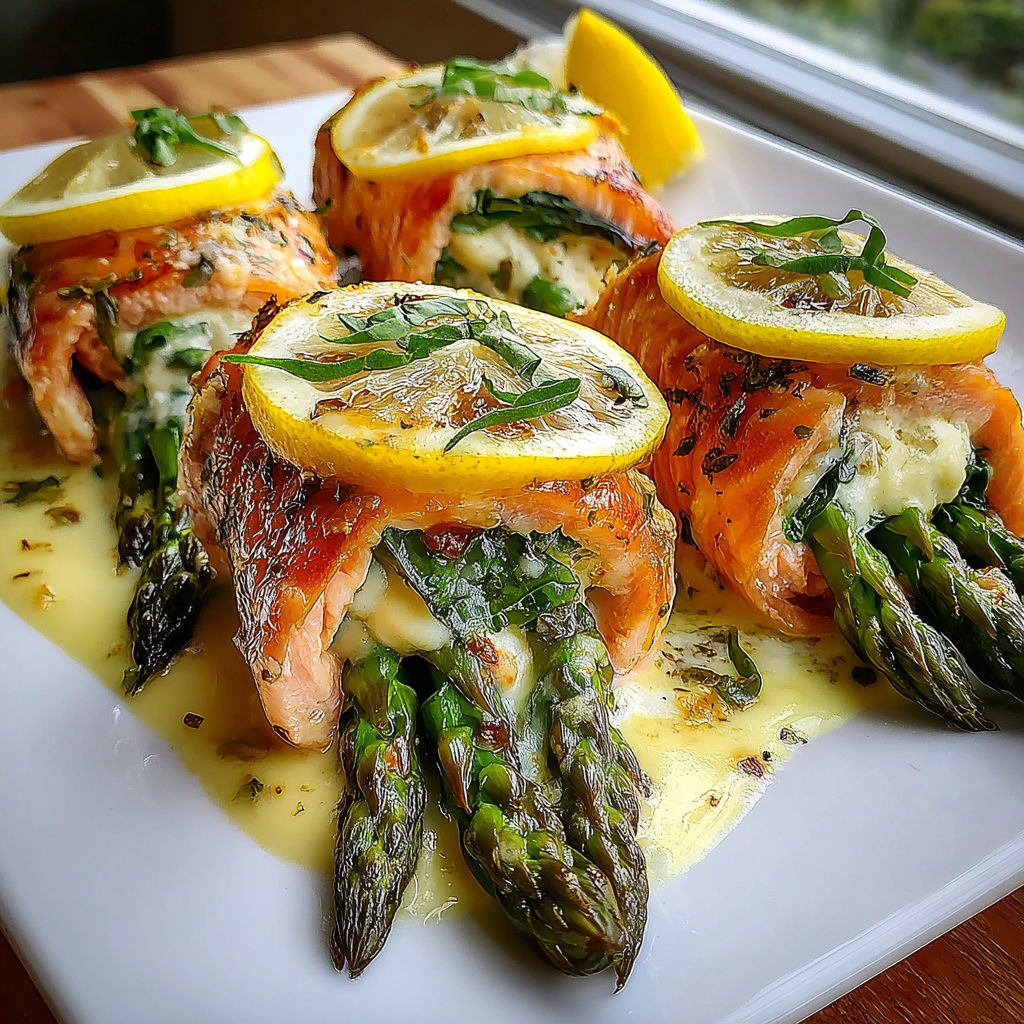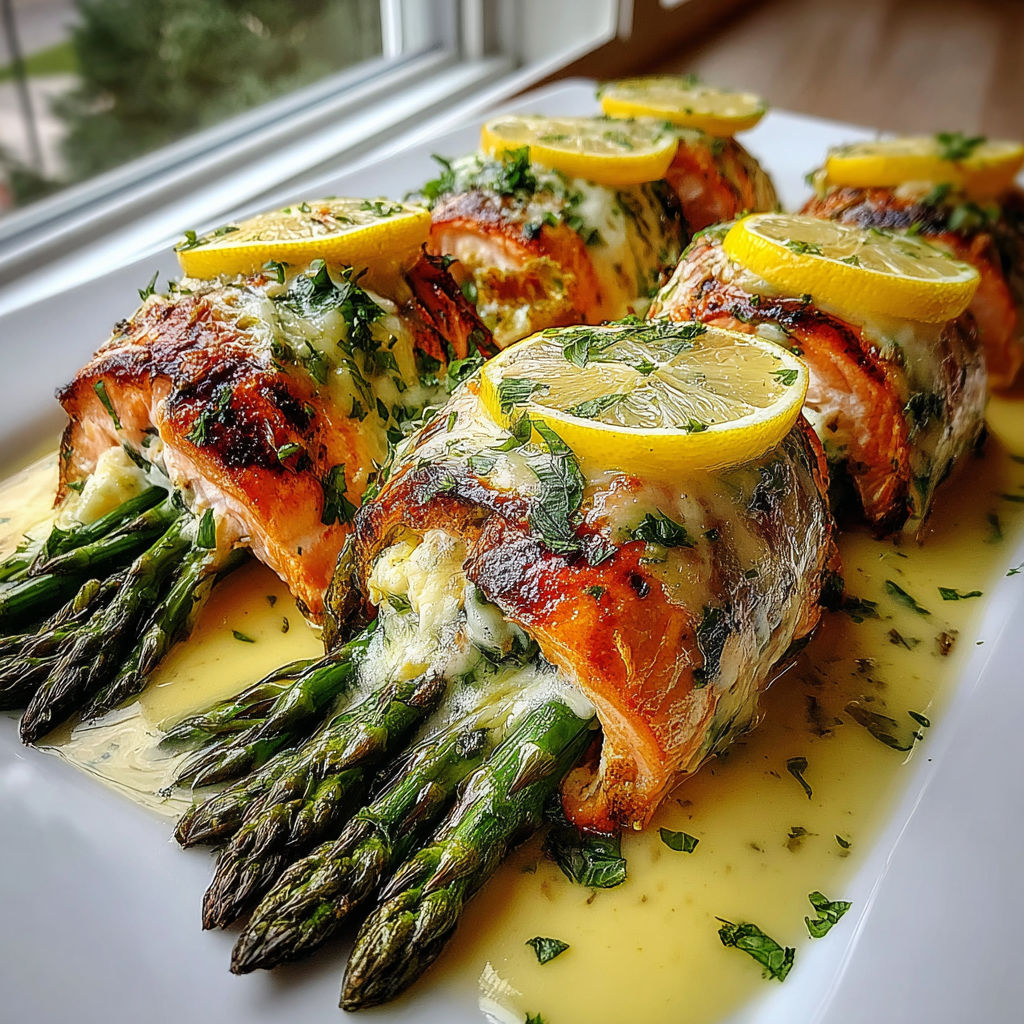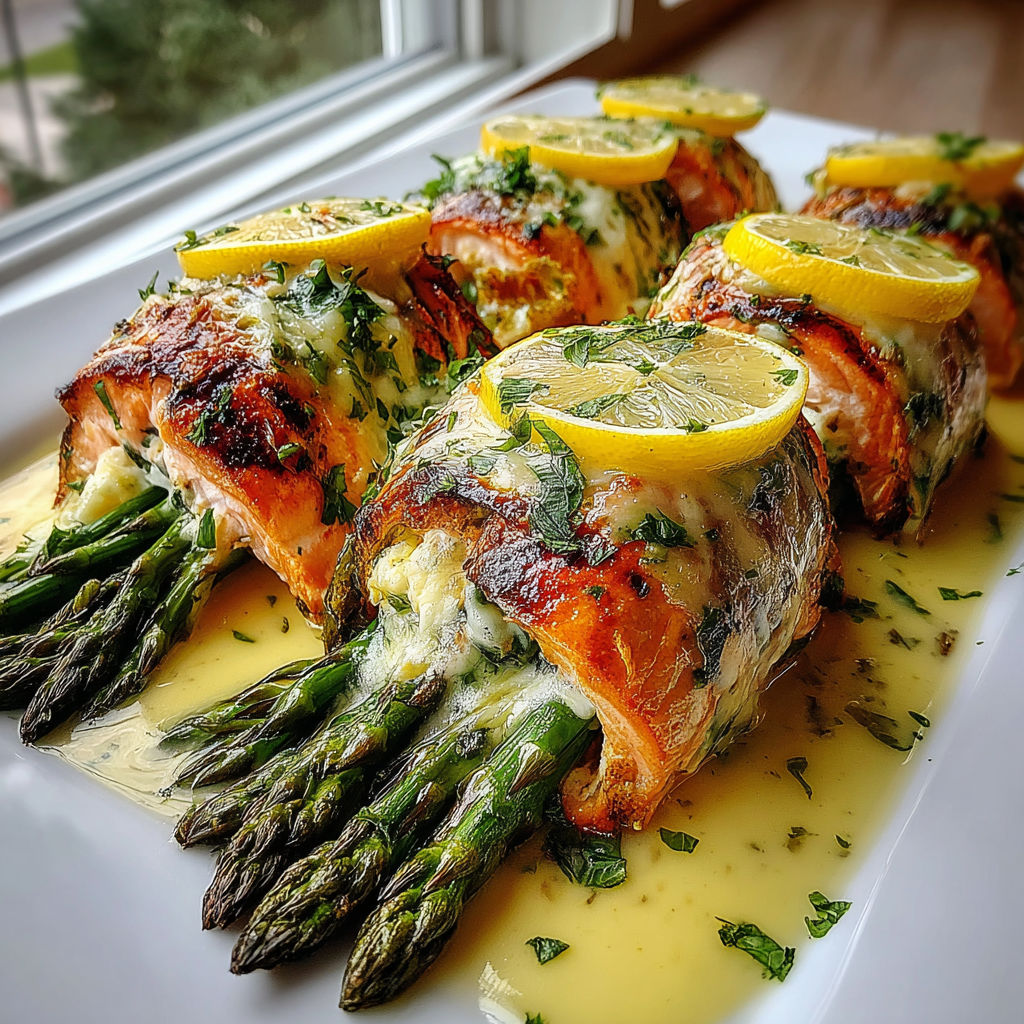 Save
Save
This vibrant stuffed salmon is my favorite way to turn a weeknight dinner into something truly special The creamy lemon basil ricotta peeks out from flaky salmon rolls wrapped around crisp-tender asparagus all finished with a fresh lemony sauce It tastes indulgent but comes together without a lot of stress and looks elegant enough to wow guests or impress on a quiet evening at home
Each bite layers creamy herby cheese with salmon and asparagus I first made these rolls for an anniversary at home and they became an instant household favorite I love the balance of creamy tangy and herby in every forkful
Ingredients
- Salmon filets: Boneless and skinless thicker pieces benefit from gentle butterflying Wild-caught is ideal for flavor
- Asparagus: Look for firm stalks without wrinkling Thin spears cook up crisp-tender and fit best in rolls
- Ricotta cheese: Use whole milk ricotta with excess liquid drained for creaminess Choose one with fresh milky aroma
- Lemon zest and juice: Freshly zested lemon adds zing and juiced lemon sharpens all the flavors
- Fresh basil: Choose bright green leaves only Chop just before mixing for fresh flavor
- Parmesan cheese: Purchase a block and grate at home for best melting and richness
- Garlic: Mince cloves fine for even distribution in both filling and sauce Use fresh over jarred for bold flavor
- Flour: Helps the lemon sauce thicken to silky finish Opt for unbleached all-purpose variety
- Vegetable or fish stock: Either works but homemade or low-sodium stock keeps flavors balanced
- Olive oil or butter: A choice for lightness or extra silkiness in finishing the sauce
- Cream or milk: Adds rich body to the lemon sauce If possible pick heavy cream for lush results
- Fresh parsley or dill: These finish the dish with a burst of color and a slight herbal note Snip leaves right before serving for best aroma
- Salt and black pepper: Fresh cracked pepper and sea salt bring out natural flavors Go light on salt if your parmesan or stock is already salty
Instructions
- Prepare the Ricotta Filling:
- Combine ricotta cheese lemon zest lemon juice chopped basil garlic parmesan salt and pepper in a mixing bowl Stir vigorously until the mixture becomes creamy light and flecked with basil Taste for balance adding more zest or salt if desired Set aside to allow flavors to meld
- Blanch the Asparagus:
- Bring a large pot of salted water to a rolling boil Drop trimmed asparagus in for exactly two minutes Do not overcook Immediately transfer to an ice water bath or rinse under cold water to stop cooking Pat dry thoroughly so the filling does not become watery
- Prepare the Salmon:
- Lay each boneless salmon filet flat on your cutting board If the filet is thick slice lengthwise with a sharp knife to butterfly it then gently pound to an even thickness using a meat mallet or rolling pin Season both sides of each filet with a light sprinkle of salt and black pepper for balanced flavor
- Fill and Roll the Salmon:
- Spread about two tablespoons of the prepared ricotta mixture evenly along the center line of each salmon filet Top with two or three blanched asparagus spears Press gently so the filling stays in place Roll the filet starting from one narrow end to the other keeping the asparagus at the core Secure the rolls closed with toothpicks or tie gently with kitchen twine Brush the outside with olive oil for color and flavor
- Sear and Bake:
- Preheat your oven to three hundred seventy five degrees Fahrenheit or one hundred ninety degrees Celsius Heat a skillet over medium high and add a thin layer of olive oil Sear each salmon roll seam side down for two to three minutes until lightly golden brown Transfer seared rolls to a baking dish Place in the oven and bake for twelve to fifteen minutes or until a food thermometer reads one hundred thirty five to one hundred forty degrees Fahrenheit at the center
- Prepare the Lemon Sauce:
- In a small saucepan over medium heat warm olive oil or butter until shimmering Add minced garlic and sauté for thirty seconds until aromatic not browned Sprinkle in the flour and whisk to form a bubbly roux Cook for one minute pouring in the stock slowly whisking while pouring Bring to a gentle simmer and stir in lemon juice lemon zest salt pepper and the cream if using Continue to cook for three to four minutes until slightly thickened Taste and adjust seasoning if needed
- Plate and Garnish:
- Remove salmon rolls from the oven and discard toothpicks or twine Place one or two rolls onto each plate Drizzle generously with the freshly made lemon sauce and finish with chopped parsley or dill Serve hot with your favorite sides like roasted potatoes or spring greens

Salmon and asparagus were always a sign of spring in my childhood kitchen I am especially partial to the way fresh basil transforms the cheese with garden aroma This dish brings back memories of cooking with my grandmother in her sunlit kitchen as we waited for the first asparagus harvest of the season
Storage Tips
Let leftovers cool completely before wrapping tightly and refrigerating Salmon rolls keep for two days Reheat gently in the oven covered at low temperature to preserve tenderness The lemon sauce can be made ahead and kept in the fridge for three days so warm slowly on the stovetop before serving If freezing assemble the unbaked rolls then wrap tightly and freeze up to two months Thaw overnight in the fridge then bake as directed
Ingredient Substitutions
If you do not have ricotta try blending cottage cheese for a similar texture Goat cheese also works for tang Tomato basil cheese is fun for a twist Use spinach or tender green beans in place of asparagus in off season Swap fresh dill for basil for a Scandinavian accent For dairy free need blend silken tofu with a splash of lemon as a soft cheese stand in Almond milk can replace cream in the sauce
Serving Suggestions
These stuffed salmon rolls pair perfectly with garlicky sautéed broccolini or a pile of lemon roasted potatoes For a lighter meal serve over greens tossed in vinaigrette A chilled glass of sauvignon blanc makes the flavors sing For lunch slice cooled salmon rolls atop a mixed spring salad
Cultural and Seasonal Context
Stuffed and rolled fish dishes are popular in Mediterranean cooking where lemon fresh herbs and local cheese play center stage Spring marks the best time for pairing salmon and asparagus when both are at peak flavor This recipe works nicely for Easter or Mother Day brunch and brings a festive touch to any occasion
Seasonal Adaptations
In spring use wild salmon and pencil thin asparagus For autumn try roasted butternut and sage in the filling Winter calls for sturdy broccolini or spinach in place of asparagus Lemon zest is best grated fresh just before serving Citrus blossoms hint at the season
Success Stories
My sister prepared this for her book club and everyone requested the recipe A friend doubled it for a dinner party and guests raved even picky eaters Cleaning up is a breeze since you can prep everything ahead Try this as a lighter main course for special gatherings or just because
Freezer Meal Conversion
Roll the salmon and fill as directed then freeze rolls raw on a tray Wrap individually for easy grab and bake on busy nights All you do is thaw and bake off the rolls and make the sauce fresh You can also freeze baked rolls though fresh baked always tastes best

This stuffed salmon is sure to become a favorite for both special occasions and everyday meals The elegant presentation and fresh flavors make every bite memorable
Common Recipe Questions
- → How do I keep the salmon from falling apart when rolling?
Make sure your fillets are even in thickness. If needed, butterfly and flatten thicker fillets. Secure the rolls gently with toothpicks or kitchen twine before searing and baking.
- → Can I prepare the filling ahead of time?
Yes, you can mix the ricotta, herbs, and seasonings in advance and refrigerate until ready to use, saving time when assembling the salmon rolls.
- → What can I substitute for ricotta cheese?
Cottage cheese or mascarpone can be used in place of ricotta. Drain excess liquid for best texture.
- → How do I know when the salmon is cooked?
The salmon is done when it flakes easily with a fork and the internal temperature reaches 135–140°F. Avoid overcooking for best results.
- → Is it possible to use another fish instead of salmon?
Thin white fish fillets such as sole or trout can work, but handle them delicately as they may be more fragile than salmon.
- → Can I make the sauce richer?
Stir in a bit of cream or milk towards the end of cooking the sauce for a creamier texture and flavor.
